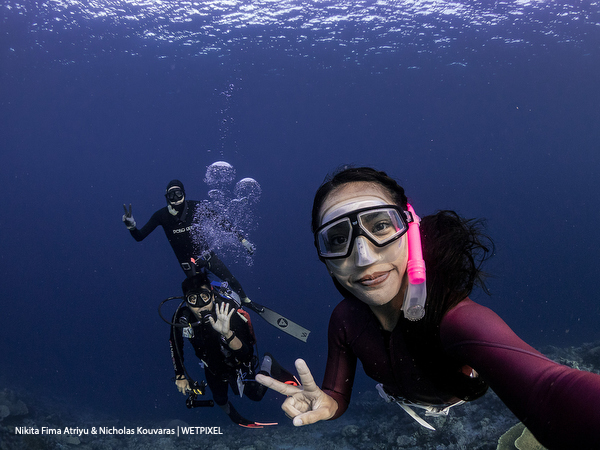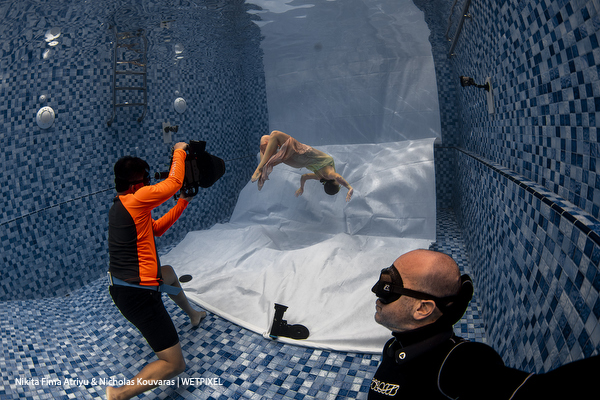Underwater Modelling and Photography by Nikita Atriyu & Nicholas Kouvaras
Instroduction:
My name is Nikita. I have been freediving for almost 6 years now but I dreamed of being in the water forever. I am a freediving instructor and an athlete. I have several National records for Indonesia. I have been teaching freediving for the last 4 years, my students are mostly beginners with zero skill of swimming and sometimes they are afraid of the water too. My adventures in the underwater world started in an aquarium as a mermaid. I performed daily for Jakarta Aquarium in an underwater theatrical show everyday for 5 years. I am also a mermaid instructor. I teach people how to swim like a mermaid, posing underwater and staying relaxed in the water with all the mermaid equipment and big dresses. Honestly it is a lot easier to do a freediving course than a mermaid course. Between Mermaiding and Freediving we always have customers who want to do crazy stuff. So as long as the safety is handled well, why not?
- Nikita Fima Atriyu
- Pure apnea freediving instructor trainer
- Freediving National record holder for Indonesia
- Professional mermaid
- MFI Mermaid Instructor trainer
- Underwater model
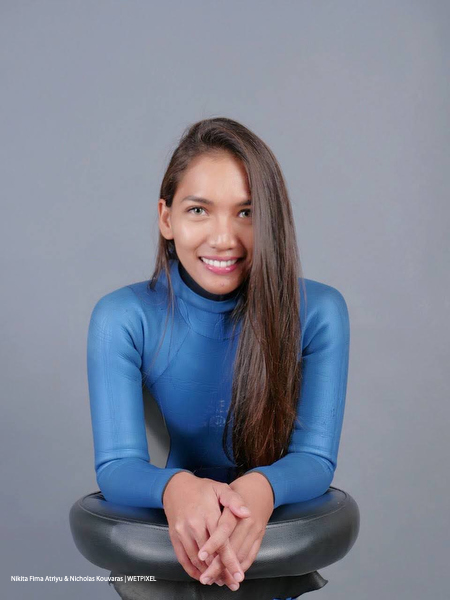
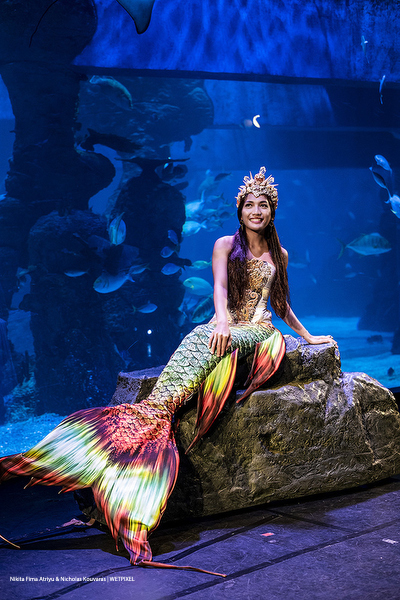
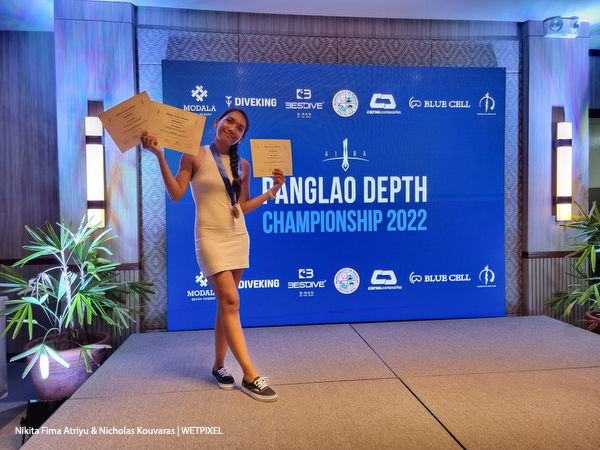
Nikita’s background as an underwater model.
From the start of my career as a professional mermaid. I had to perform everyday without goggles or a mask, wearing a mermaid tail and a big heavy dress. The result was that I became more conscious and more aware. Not only of my body but also of my outfit and of the environment. I became a better mermaid and a better freediver. My skills, the fame from the competitions and the records along with the visibility from the performance in the Aquarium landed me the first modelling jobs. I entered the world of underwater modelling and I had the good fortune to be part of projects like: Wonderful Indonesia, The Ministry of Tourism of Indonesia’s advertisements, movie clips, photoshoots and TV shows. Modelling UW It is not an easy job but we can learn how to do it.
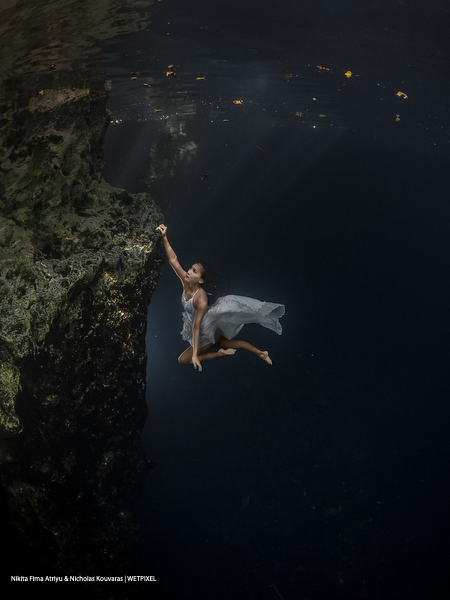
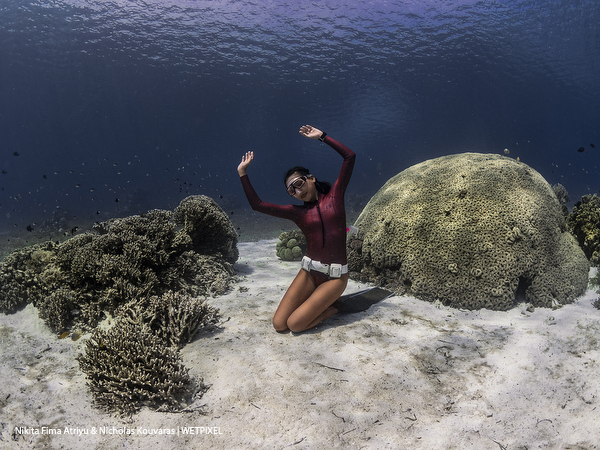
Underwater modelling & photography
Underwater model photography is also referred to as underwater studio photography or underwater pool photography. Basically, underwater model photography refers to underwater photography conducted in a controlled environment (such as a pool) with designated underwater models. A controlled environment facilitates the use of advanced lighting techniques such as underwater umbrellas and off-camera strobes. In our days UW model photographers venture more often into the ocean. In the ocean lighting but mostly importantly safety becomes a lot more complicated.
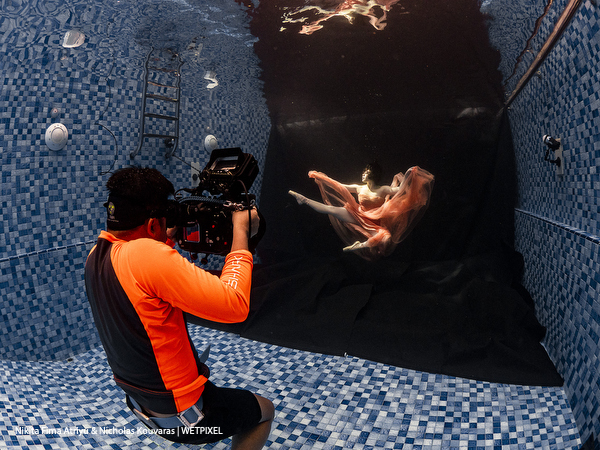
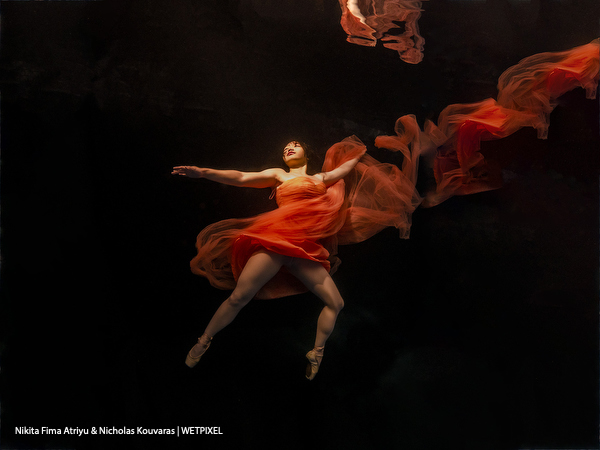
Purpose of underwater modelling and photography
We live in a world of content creation. Creating images that catch the eye is becoming harder and harder. The element of water can make anything look more dramatic and other worldly. The density of the water freezes motion and makes everything suspended. Hair, Fabrics, accessories flow in a way that cannot be replicated on dry land. Underwater modelling gives the opportunity for the photographer to create stunning images. Images that surprise and capture the attention of the audience. But compared to studio photography, underwater modelling shoots need a lot of preparation before you do it. Working underwater can and will increase the risk of an accident. In 2016 the young model Olivia Ku drowned while posing for an underwater shoot. The incident shocked the underwater shooting industry. Safety is paramount. You have to train and work with a professional team. Safety always comes first.
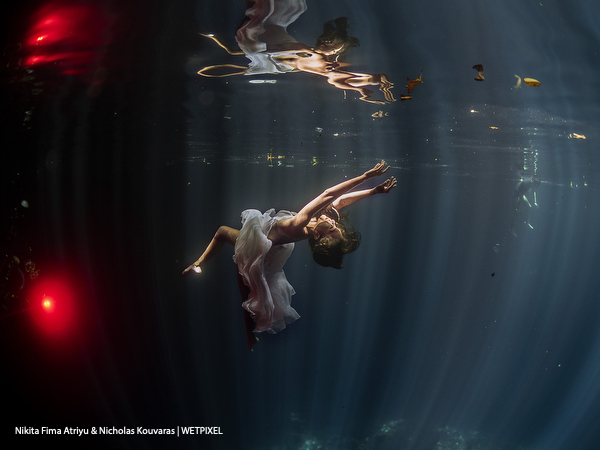
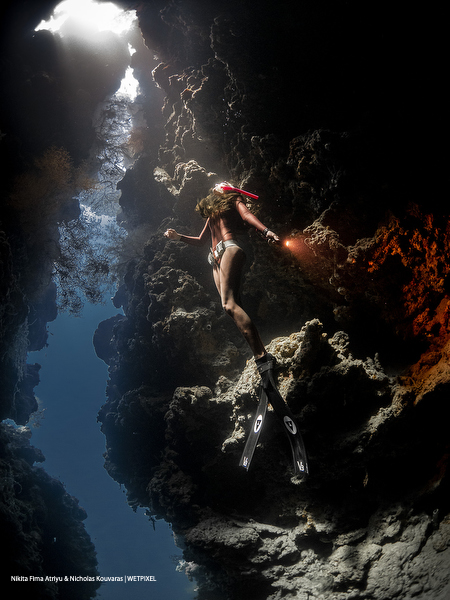
Freediving Skill
In Underwater modelling there is one parameter that makes things difficult and dangerous. While posing you cannot breathe. Before we start underwater modelling we need to make sure we are fit for it. We need to start with the right training. We don’t want to put ourselves and our team in danger. Being a confident swimmer and ideally being a freediver will make things easier and safer. Staying calm and relaxed while in the water is the key to a long breath hold, having a calm mind means that your body is not burning as much energy and is not using up all your oxygen. In freediving we will learn the skills that we need in underwater shooting. Good freedivers make good pictures.
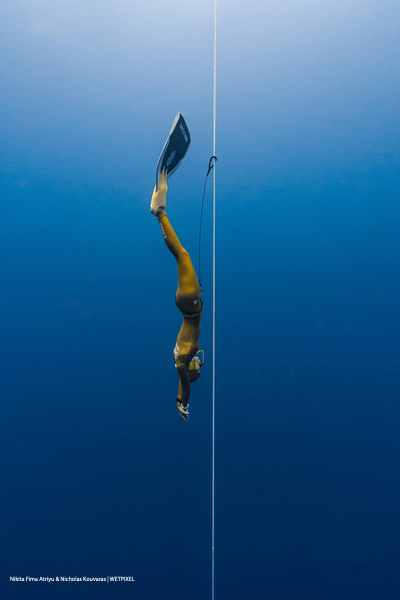
Scuba Diving Skill
There are some conditions that will not allow us to do freediving for the underwater photoshoot. Like having a big dress in a deeper spot or taking underwater pictures inside a shipwreck that is not easy to access. So we need to use Scuba Equipment to breathe underwater. But breathing compressed air underwater brings many risks with it like decompression sickness, nitrogen narcosis, pulmonary embolism, death and more. We must be experienced and trained so we can stay calm in any situation. We will have to hols our breath, we will not be able to see, We will have stinging saltwater in our eyes, our nose and sinuses will be full of water and we are going to be shivering. Still we will need to be able to concentrate, keep calm and smile.
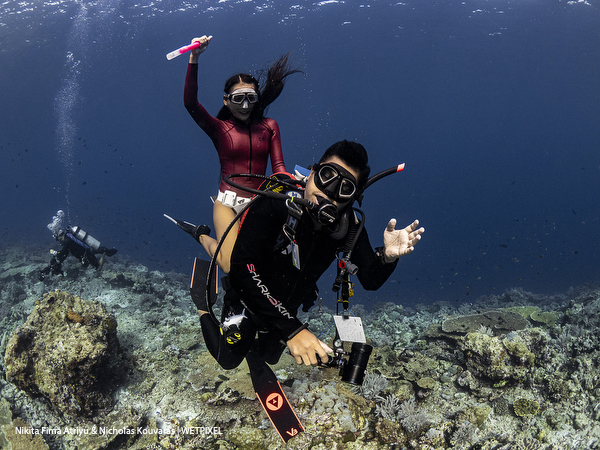
Modelling Skill
This is one of the skills we should know before doing an underwater shooting. We are the centrepiece of the image. It would not be fascinating if we only do a standing pose while holding your breath with a sour face. Using the movement of our hands and legs creating a Triangle pose, for example, will be much more attractive. Controlling our facial expression is also very important in underwater shooting. Keeping the eyes open and relaxed. Making sure there is no tension in the muscles in the face and keeping the mouth slightly open will give the picture a more natural and pleasant look.
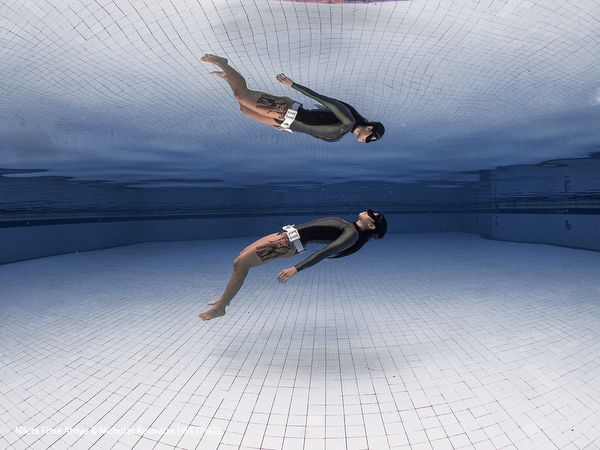
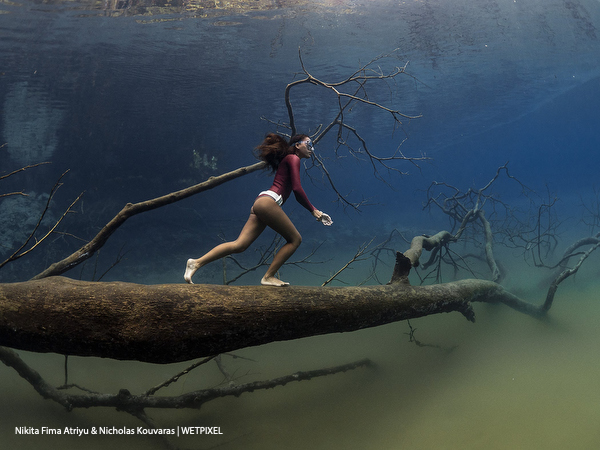
Equipment
Mask and snorkel, we need to check the venue before we start shooting. During the shooting we cannot see anything. It helps a lot knowing where we are.
Nose clip. Some people can control the water getting inside the sinuses, but we have Nose clips if we want to prevent the water from getting inside our sinuses.
Dress/Dresses. Dress for the role but keep in mind the bigger the dress the harder it is to move and adjust. It also makes it harder getting back to the surface.
Weights. Adjust your buoyancy right. For me it is better to sink a little bit rather than float. The depth and the material of the dress will affect our buoyancy.
Remember that colours will change in depth so, we need to choose the colour of our makeup wisely and honestly we don’t need lots of makeup underwater. Our face looks 10x times more beautiful in the water, If we are relaxed and we enjoy it.
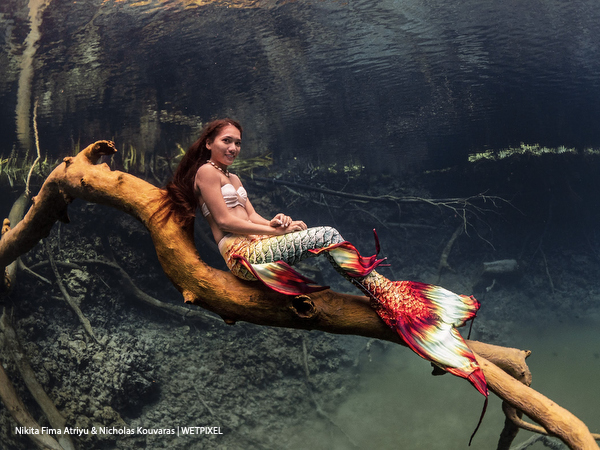
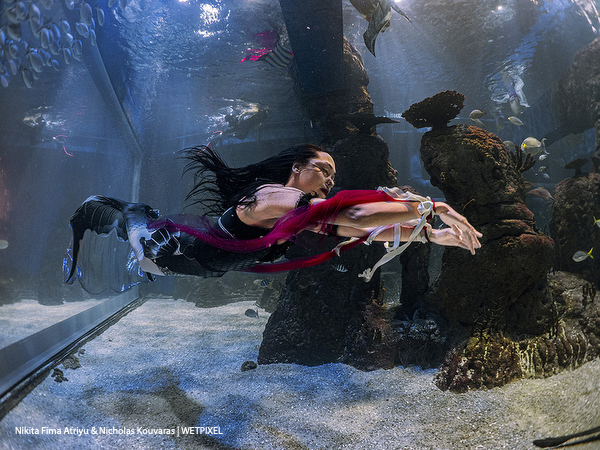
Tips for the model
The light. We need to be aware where the light comes from. The water always moves, we cannot stay in the same place. Sometimes we drift with the current. We don’t want to cover our face with shadows because the photographer is against the light.
Consciousness of our body. The hair, the face, the hands, the legs. The hair is very crucial in the water, we don’t want to have it on our face. The face expression will tell the picture. We must remember to have your hands relaxed. Our legs are on point like a ballerina.
Signals. The communication between the model and photographer is very important, creating and practising signals before getting in the water will help the photo session run smoothly.
Know the tools. If you want to make it easier, you need to put yourself in the shoes of the photographer. It is wise to know what happens behind the lens. Knowing a little of UW photography and how to take pictures nicely will help to improve your skill in posing too. Before I learned about photography I was just posing and I let the photographers fix everything. Now I notice small things that will help the photographers create better pictures that need less editing.
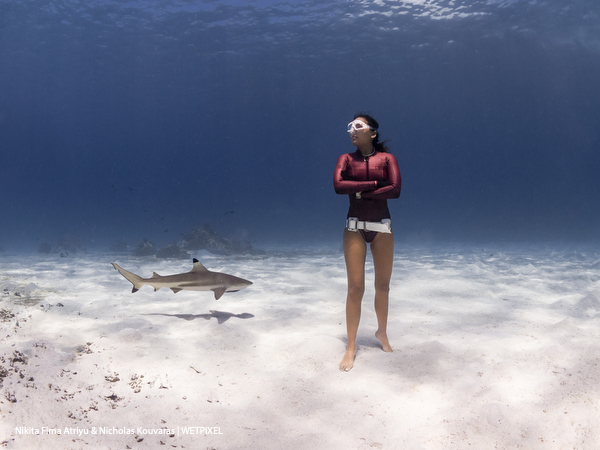
The photographer
Freediving and Scuba diving is not only about going deeper and deeper. There are many recreational divers who love to take pictures underwater or just want to take pictures of their partner. When you dive, one way or another, you will also have the opportunities to capture amazing pictures. It doesn’t matter what camera you are using, as long as you understand your tools, you can always produce a good picture. Know your equipment. Shooting a model will not allow you time for experiments. Time is limited by cold and fatigue. Make every click count.
Know the model. We are very beautiful when shot by someone who sees the beauty in us.
Know the venue. The light, the currents and the tides. Know when it is best to shoot.
Use positive encouragement. Show the nice pictures to the model.
Take beautiful pictures and don’t rely too much on post editing. Water is difficult to edit. Sometimes impossible. Always white balance.
Don’t be afraid to take a break and talk to your model. Use the proper lenses. Don’t use fisheye lenses for close ups and don’t use rectilinear lenses when the water is not clear. Editing is crucial. Staying up to date with the latest techniques and software updates will not only help you create better images but also makes you more attractive as a photographers to the models.
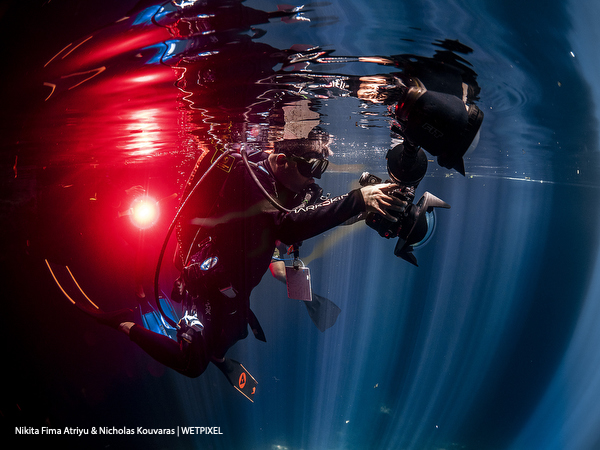
Safety
In my experience, a photoshoot while freediving is perfect when done in no more than 10 metres. More than that, we will get tired of going up and down especially if we are diving without fins and wearing a dress. Also the natural light will not be very good if it is deeper. We must always have a dedicated safety diver or divers that can bring us back to the surface quickly. We need to have something or someone to hold on while we rest and breathe at the surface. Again communication is key. Creating and practising our signals beforehand is very important. Freedivers are good safety divers. If we have to breathe compressed air underwater for certain conditions, we need to have the appropriate skills of scuba diving. In my experience being a divemaster will make things a lot easier. It is a lot safer if we have a lot of dives logged and we have faced adversity in the water. Again we will need a dedicated safety diver.
